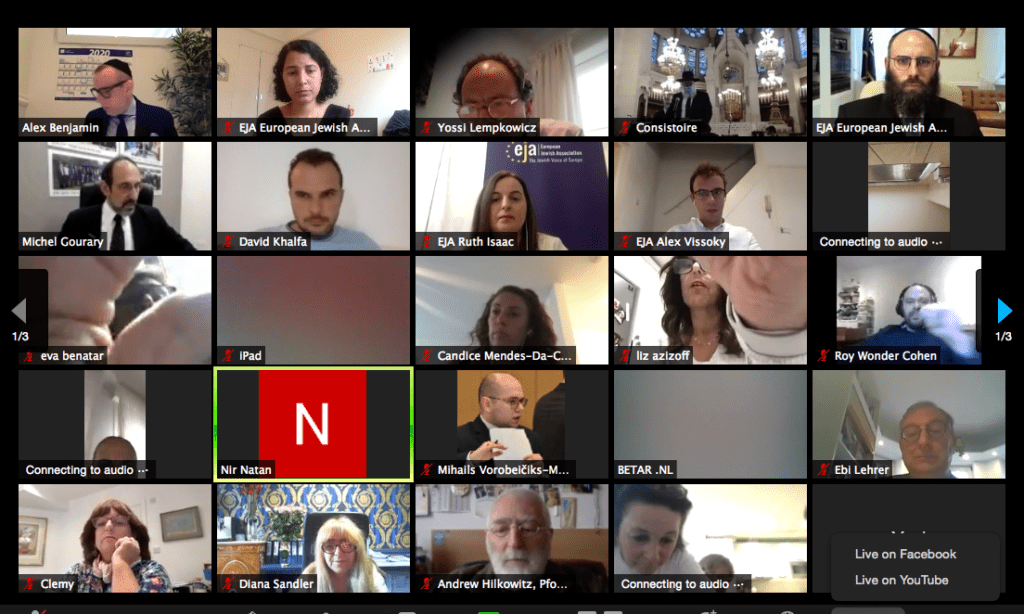“The Jews of Europe have had to deal daily with the Fallout of the virus but also with anti-Semitic plots and threats of cuts in the security budgets of Jewish synagogues and institutions,” said Rabbi Margolin, Chairman of the European Jewish Association who initiated the event.
Jewish communities across Europe have been severely affected by the Corona epidemic and challenges associated with lockdowns.
The Jewish death toll is estimated to be in the thousands. Community leaders say that in many cases the strict rules in place prevented many Jews from attending the funerals of their loved ones, and estimated that a significant number of Jews had died and were buried in civil burials as a result of the restrictions in place.
In order to enable European Jews to mourn and share the memory of their loved ones, Rabbi Menachem Margolin initiated the launch of a virtual Yizkor event in memory of Jewish corona victims via Zoom.
Omar Yankelevich, the Chief Rabbis of Israel and dozens of Jewish community leaders and rabbis from across the continent were in attendance.
The event also saw JNF Chairman Danny Atar announce that a tree will be planted in memory of each of Europe’s corona victims.
During the event, Diaspora Minister Omer Jankelevich greeted those present on behalf of the Israeli government, stating that: “we share pain, the diaspora’s pain is our pain and we in Israel know that our pain is also yours. We must mourn but we must also rebuild. And it is time for concrete actions. That is why I am heading up a 100,000 shekel fund to help support Jewish development in the diaspora, to deepen our shared bonds.”
Ashkenazi Chief Rabbi of Israel David Lau and Sephardi Chief Rabbi of Israel, Rishon Lezion, Yitzhak Yosef reminded that “G-d when he asked Moses to count Israel, he didn’t want just numbers, but names. The letters of G-d are in every name, and every one of us is special. When we mourn, G-d mourns too. We must find our strength, in our names, so interwoven with G-d to overcome, to deepen our commitment to Judaism, and to honour our loved ones.”
President of the French Consistoire Joel Mergui and Paris Chief Rabbi Michel Guggenheim that “we have all carried a heavy burden. And we have cried at the loss, but also at our inability to embrace and support each other because of quarantine and lockdowns. We owe it to those who have passed to ensure that we do what we can to ensure that our synagogues will be packed as we approach the high holidays, that we show them the honour that comes from our strength to continue and to come back to our houses of prayer, stronger, more resilient and with a renewed determination to ensure a Jewish future.”
Belgian President of the Jewish Community of Philip Markiewicz:
“We suffered tremendous pain, but there was also tremendous solidarity, amongst our communities but also as society as a whole towards our communities and vice-versa. The Jewish contribution to society must continue, it must deepen. We must do this for our shared future full of optimism and hope, but also to honour the memory of our loved ones.”
Chairman of the European Jewish Association (EJA), Rabbi Menachem Margolin,
“The Corona epidemic has severely damaged many Jewish communities across Europe but has strengthened our belief that we all look out for and after one another.
Along with dealing with the terrible crisis, we have witnessed daily the strength of the Jewish spirit and the countless acts of kindness within Jewish communities across the continent. And so, this memorial event is on the one hand a commemoration of the many victims of the virus and on the other is to honour, strengthen and cherish the resilience and fortitude shown by Europe’s Jewish communities. “
















